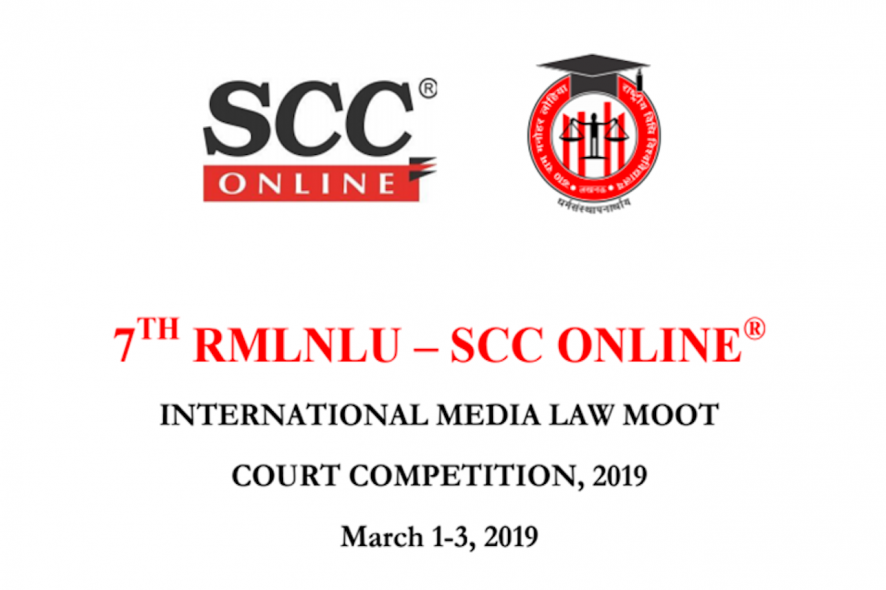Dr. Ram Manohar Lohiya National Law University, Lucknow is back with its 7th edition of Int. medial law moot in association with SCC Online. Witnessing participation of 33 teams from all corners of the country RML looks forward to make this edition a memorable one.
RMLNLU-SCC Online Moot which was first conducted in 2013 intents to bolster interest in media law amongst the student fraternity. The competition has since gained more and more reputation with each edition, by maintaining high standards in terms of judging quality, hospitalization, and organization. And such high stakes have been maintained by a bunch of smart, witty peeps i.e. The Moot Court Committee (MCC) of RML which has its members from the 1styear to the 5thyear.
Incentives have also been the driven force notwithstanding for anyone from time immemorial to the rapidly advancing world of the 21stcentury. Even the students see participation in such prestigious moots as adding a feather to their cap. Apart from what the Competition seeks to achieve for itself and the participants, there are some big prizes up for grabs. There are 4 categories of awards – Winners, Runners Up, Best Oralist and Best Memorial with Prizes ranging from INR 5,000 to 25,000.
The inauguration Ceremony was held in the Seminar Hall of the College on 1stof March. The first day witnessed only the registration of the teams, match-ups and participants briefing apart from the Inaugration Ceremony followed by session of SCC – Online and EBC.
As the Competition goes on, the reporter for the event will host you like it’s happening right in front of your eyes. Stay tuned for all the updates.
Day 2 (2ndMarch 2019)
Judges Briefing –
It is not a bright sunny day in the city of Nawabs but this could not veil the enthusiasm as well as anxiety of the participants. All the participants, the entire MCC were fresh as daisies and were full of energy to seize the day. The day kickstarted with the Judges briefing session.
The judges briefing session began in the video Conferencing hall in the grand Madhu Limaye Library of RML which adds stars to RML’s infrastructure.
In order to maintain the lucidity and the coherence while briefing something to someone who is going through it for the first time, it would be no one else better than the person who has meticulous in depth knowledge of the same, who in this case is Mr. Abhisekh Dwivedi, the problem drafter. Mr. Abhisekh Dwivedi is the alumni of the college from batch of 2016 and is one of the judges in the Competiton itself.
10.22 hours – Mr. Abhisekh begins with acquainting the judges with the facts of the case, as according to him this particular moot problem was fact-intensive and the judges should know the in and out of the same.
10.27 Hours – the other judges point out the facts which were intriguing and asked Mr. Abhisekh to reiterate the same in order to ensure there were no second interpretations from the fact sheet.
10.37 Hours – the problem drafter focuses on the landmark authorities which the judges should keep in mind while the rounds will be on the roll and the same were provided in the bench memos.
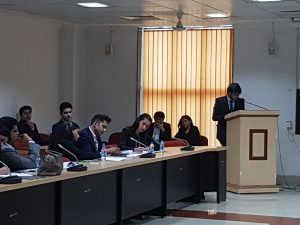
10.45 hours – Mr. Dwivedi after discussing each issue verified the same with the judges in order to ensure that all of them were on the same page. A good moot event is one where not only the participants but also the judges are well aware of the facts and case laws and know where they can pinch the participants. And the same standard was being maintained in this 7thedition.
10.51 Hours – He told where the participants would be clustering the emphasize on and the right questions to be asked at that particular split second.
The last issue dealt with the privacy of the residents and was one of the main issues as ascertained by the problem drafter. A good session of argument on this very issue may open the gates for the teams in the top 8!
10.54 hours – after Mr. Abhisekh left the podium, one of the MCC members made the judges habitual with the score-sheet. It was made explicitly clear that even the slightest change or overlapping in the score-sheet by the judges have to be followed by their sign in that particular line in order to ensure there is no tampering or misinterpretation of scores. This makes it apparent that standards of this event is considerably high and we as the curious cats want some thrilling rounds.
10.57 hours – Judges were escorted to their respective rooms where the participants were already skipping a beat with each passing second!
Prelim round 1
This particular round would witness 20 teams taking on each other to make sure that they have availed each opportunity to ensure their break in.
The preliminary rounds are about to begin! The participants are here with the moot vibes all around, time allotments are noted and the participants are glancing at the arguments before the moot begins. It’s surely going to be a brainstorming session.
Courtroom 2, Karnavati University v. SLS, Pune
11.15 hours – Karnavati were the appellants in their 1strounds, speaker 1 for the same was stating the facts in brief. But one of the judges from the division bench kept on throwing questions asking the clearity to be stated in the facts.
11.27 hours – how downhearted would it be for any speaker when they are not allowed to proceed with the arguments and are kept hanging on the facts itself. Same happened with Speaker 1 of the Appellants.
With no time left speaker 1 had to rest her part of the speech. Now everything depends on speaker 2.
11.31 hours – judge made it clear that 22 minutes were taken up by speaker 1 and hence only mere 10 mins would be given to speaker 2 to sum up his case. but the speaker didn’t took this as a snag but showed his confidence in the judges.
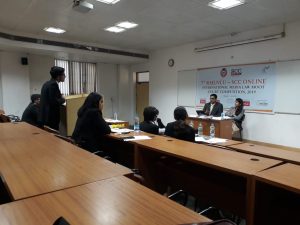
Courtroom 5, MNLU-Aurangabad v. NLUD
11.40 hours – my entry in the courtroom was a shocker to me as the judge in his not-so-good mood asked the speaker of MNLU to back up the argument with an authority.
11.42 hours – judges were asking speaker 2 of the appellants whether there was any evidence regarding the issue with which the speaker was dealing with. But before she could continue with her speech, TICK! TICK! Time over! The time keeper would be sure one person who the speakers loathe during the rounds. But it also shows how imperative it is on behalf of the oralists to take a note of the time while addressing their speech. I strongly advocate the fact that unless you don’t know how to keep up with the paucity of time in the mooting rounds, it would be difficult not only for you but also for your entire team to make it through the rounds.
11.45 hours – now was the time for NLUD to come up. But their team consisted just of 2 members out of which one was playing the dual role of oralist as well as researcher. I was certainly curious to see how would they be dealing with their rounds but due to the need to cover other rounds too, I had to make a leave.
Courtroom 4, NUJS v. Law College Dehradun
11.47 hours – any of the oralist would never want to be in the courtroom which is presided by the problem drafter as one of the judges. And that is why this particular session would be one grilling session after all. Speaker 2 of Law college was not able to dodge the bullets as Mr. Dwivedi was throwing.
11.52 hours – speaker 1 of NUJS was maintain his poise and demeanour during the course of proceedings which would surely made a good impression prima facie.
11.58 hours – but the problem drafter was throwing questions consecutively to the speaker which the speaker countered with some good repartees.
12.01 hours – speaker referred the judges to the compendium in order to bulwark the arguments put forwarded by him.
Courtroom 6, SLS Noida v ILS, Pune
12.04 hours – this prelim witnessed some serious grilling but equally good repartees by SLS Noida.
12.07 hours – judge was focussing the importance of the Lotus case which was an important authority in the present facts.
12.09 hours – speaker was referring to a foreign authority of US in order to counter-attack the question put forwarded by the learned judge.
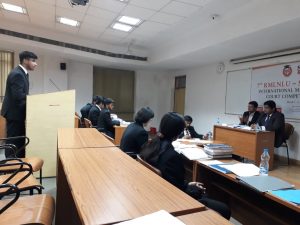
The round was not a monologue but rather an engaging exchange of words between one of the judges and the speaker.
After the rounds between NLU J and TNNLS were over, the teams were confident and when asked upon if there was any grilling faced by them, the response was in negative unlike what was being witnessed in the other rounds!
Prelim 1 was just an inception of a wonderful event with neck and neck teams trying to outdo each other and narrowing their eyes on breaking – in! There is more to this Competition, stay tuned and updated for the next prelim Rounds!
Prelim 2
After a close and acute prelim 1, the teams are back for another intense round. The round was scheduled from 1400 hours to 1530 hours. However, an hour hiatus between the two prelims didn’t break the string of vivacity of the teams. As the clock struck 1400 hours the judges moved towards the court rooms, where the participants were already waiting in desperation. There was a pin-drop silence all over the court rooms as the participating teams kept preparing for their oral rounds without wasting an iota of time continuously and tirelessly reading their memorials and written speeches.
Courtroom 7, NLSIU v. Amity Law School, Delhi
15.04 hours – it was a slow start on part of the NLSIU who were the respondents. Their speaker 1 seems to carry a docile image and was lacking credence in his own arguments. It won’t be difficult to tell that he was a bundle of nerves.
15.06 hours – the judges were trying to make a bargain with the speaker and were pushing him to concede.
15.10 hours – the speaker was referring cases to the bench but to no avail. One after another all his cases were getting good-for-nothing.
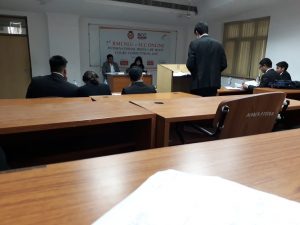
15.12 hours – the judges asked for a particular case which was not cited by the speaker. Nevertheless, the speaker advanced with the next issue.
15.14 hours – brother judge asks a question which was wrongly interpreted by the speaker to which the sister judge interrupted him and simplified the question for him.
15.20 hours – going on with this very round, it won’t be tedious for the audience to infer that the speakers to a large extent have failed to convince the judges pertaining to their arguments.
Courtroom 11, GNLU v. GLC Mumbai
15.22 hours – GNLU were the respondents and due to paucity of time judges just allotted 30 seconds to wind up the second issue .
15.23 hours – judges directly ask the speaker to come up with the strongest point and not beat around the bush. For all those, who want to pursue mooting, this should be kept in mind that putting forward the strongest argument earlier always carry brownie points.
15.25 hours – Speaker 2 of GNLU from the very dawn of his speech was thrown intriguing questions to which he responded in a well-composed manner.
15.27 hours – the judge referred the speaker on certain question pertaining to issue 1 which was the expertise of speaker 1 but to one’s surprise the speaker was even well versed with the other issues. It was a bolt from the blue for the audience as one expects the oralists to be well aware of the issues with which they are dealing.
15.34 hours – Time keeper kept on waiving the placards showing ‘two minutes left’ but the dialogue between the speaker and the bench was so zealous that the time-keeper was not paid any heed.
15.45 hours – after the round was over, the judges gave formal feedback to the participants. They were telling the main parameters that should be focused on while mooting. One of the judges said “Irrespective of whether the judge is agreeing with you or not, you have to put forward your arguments in a polite fashion.” All the proponents of mooting culture should dwell on honing their poise and courtesy apart from focusing on enhancing legal knowledge.
Prelim 3
There was no gap between prelim 2 and prelim 3 and this left certain teams in bated breath as there was no time for them to skim through their speeches. But this is what mooting is about. One will always not get apt time to deal with their arguments. Sometimes, one needs to be swift like a fox.
Courtroom 1, NLUO v. LCII, Delhi University
16.00 hours – before the speaker for NLUO could begin with her speech, the judges made it crystal clear that unless there was an extra copy of the compendium to the other team, the judges would not like either of the teams to pass on the compendium to the bench. This benumbed the participants but they had no option but rather to go on with their arguments.
16.02 hours – the persistent attrition of question by the judges made the speaker difficult to stand with the pace.
16.05 hours – ‘Investigative Journalism’ was the expression on which there was a long exchange of words between the speaker and the two sister judges.
16.10 hours – with each passing moment the arguments put forwarded by the appellants were not suffice enough to convince the judges. And it won’t be a gruelling task for anyone to face read the judges and claim that they were losing interest in the subject matter.
Courtroom 5, KLE Society Law college v RGNUL
16.18 hours – RGNUL were the appellants and the first speaker was dealing with the right to customary law and the judges were not permitting the speaker to move with the next issue unless the judges are contented.
16.23 hours – Judges were stressing on the point that the Nicaraguo case would not be applicable in the present scenario as the facts of the two cases are poles apart.
In the mooting world, those cases are heavily relied on whose the legal ratio is not only germane but also the factum of the case to an extent are similar.
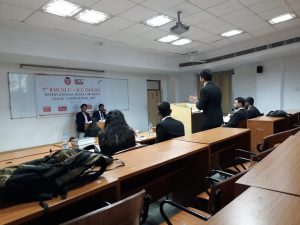
16.26 hour – Judges asked whether the speaker 2 was an agent or counsellor in the present case to which he replied he was the former and citied the apt act to which the judges had no option but to let the speaker proceed. I’m sure the speaker would be having his salad days. RGNUL was on a roll!
Courtroom 6, UILS Punjab v. MNLU Nagpur
16.40 hour – speaker 2 of the UILS was indulged in a heavy ‘debate’ with the judges and was not paying heed to the hand movements she was making. Nevertheless, she had no intent to do so but it would heavily affect her scoresheet.
16.44 hours – as the speaker 2 of the UILS moved on with the 4thand the last issue she heavily relied on one Google case.
16.47 hours – ‘Your lordship, can the agent has an extension of time?’. This phrase is always on the lips of the speakers. I’ve hardly witnessed any session where the oralist didn’t seeked an extension of time.
The rounds witnessed immensely flawless argumentation from the participating teams in each and every court rooms. Some of the court rooms saw grilling by the judges, and at the same time saw strong and witty responses by the participants. There was deep involvement and indulgence by the participating teams during each and every minute of the session, and the same could be observed in every speech that they gave, smartly rebutting the points raised by the other while speaking as if it were a series of arguments and then making an attempt to imprint their arguments in the mind of the judges.
Everyone has been on the edge of their seats to know the teams which had made it through the prelims. It was for certainly a series of engaging tense rounds but not everyone can make through it. So hold your horses!
The following teams have made it to the top 8 (order wise)
- NLU-J
- SLS, Hyderabad
- NUJS
- SLS, Pune
- NLSIU
- School of law, Christ
- SLS, Noida
- NLUO
We would congratulate the aforementioned teams. And you my friends, have to wait a little to get the updates for the thrilling quarters. Don’t turn off your cell phones. And stay tuned
Quarter-finals
After a tiring and intense rounds of prelims, the stakes are set high for another grilling quarter finals. The teams making it in the top 8 didn’t wasted a jiff and started scanning and marking the loopholes of the opponents memorials and reciting their speeches over and over again. So let’s not waste another moment and head directly towards the quarters.
Courtroom 1- NLUJ v. NLUO.
18.50 hours – speaker 1 of NLUJ began with the proceedings. Being the top team to break in must have boosted their confidence but have also set the benchmark and an obligation to make it in the semis. How the speaker will deal with this is to be found out!
18.54 hours – a Bluff made by the speaker was of no good and the judge berated the speaker on the same to which he withdrew the argument in a very polite fashion.
18.56 hours – the judges did not bought one of the cases put forwarded by the speaker to which they asked if he had any other authority. And yes he did had another case. This makes it apparent that the NLUJ could not accept affording even the minutest of details at this crucial point.
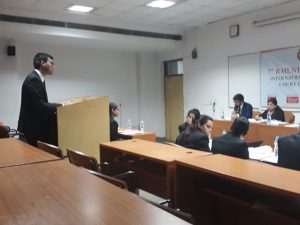
19.02 hours – another submission of ‘the gratuitous payment’ was also wasted.
19.04 hours – this however didn’t snagged him but he put forwarded all his ace arguments to make sure that he convinces the judges.
19.06 hours – judge made the speaker refer to the factsheet and interpreted the facts as totally polar to what was purported by the speaker.
Courtroom 2, SLS Hyderabad v. SLS Pune
19.10 hours – it’s a scrimmage between two facets of the same University. Hyderabad were the appellants.
19.11 hours – after a heavy blow suffered by speaker 1, all the hopes were rested on the shoulders of speaker 2 who was dealing with issue 3 & 4.
19.13 hours – Compendium was referred to the judges to buttress the argument but to no avail as the sister judge had a different perusal of the line quoted by the speaker.
19.17 hours – the sister judge was not in an accord with the speaker and was instructing her to ‘argue on point.’
19.20 hours – the sister judge tangled the speaker so intrinsically that she was on the verge of conceding her points.
19.24 hours – Brother judge in order to check the legal knowledge asked the validity of the draft article.
19.26 hours – before she could answer the question asked, another question was thrown at her. The speaker here broke a sweat.
19.27 hours – not even Hyderabad but also Pune started to panic as they would also be facing the same judges in the coming few minutes.
19.30 hours – but the speaker hanged therein. She managed to dodge the questions thrown at her somehow and came up with the next issue.
Courtroom 3, NUJS v Christ, Bangalore
19.37 hours – Christ were the respondents. The judges asked the facts to which the speaker broke the same in a well-organized way which shows how lucid the speaker was pertaining to the factsheet.
19.40 hours – issue 1 was pertaining to the ‘right to be forgotten.’
19.45 hours – the speaker cited one of the authorities to which its validity was being questioned by the full bench.
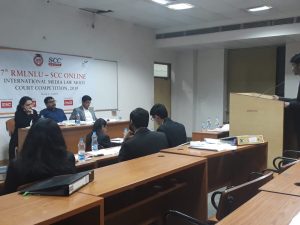
19.47 hours – ‘Data Controller’. This expression was being used by the speaker to which judges had certain questions. And the speaker was well aware of the answers and put forwarded them in a coherent manner.
19.48 hours – Google Spain case was another authority referred.
19.50 hours – this session as opposed to the high stakes that are usually maintained in quarters turned out to be a little above the average show for the audience who wanted a 1.15 hour of intensive grilling show.
Courtroom 4, SLS Pune v. NLSIU
19.55 hours – the young team of Bangalore takes on the experienced team of Pune.
19.57 hours – “your excellency those are just allegations…” and this is how SLS Pune counterattacked to the allegations imposed by the judges.
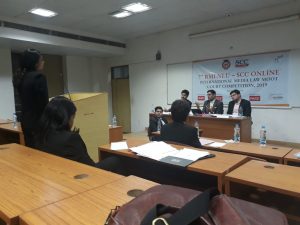
20.05 hours – the speaker moved on to the next issue where she contends that there was no breach of privacy by their clients.
20.07 hours – Click Wrap agreement which was imperative from the point of view of discussion was also put forwarded by the speaker 2.
After another up and down rounds for the 8 teams, the results were to be announced. How dreadful it would be for any team to come this far and just lose by a margin. But to not waste any other moment, the following teams would still hold the title of Sem-finalists even if they lose (order wise)
- SLS, Noida
- NUJS
- SLS, Pune
- NLUJ
We congratulate the teams for breaking in and wish them luck for the coming round! Do well and make your college proud!
Semi finals
The semis were scheduled at 11.00 hours on the last day of the 3 day event. The teams were excited but a little tensed too and were well prepared with their arguments as they had the whole night to themselves which they would might have used judiciously.
Courtroom 1, NLUJ v. SLS Pune
11.05 hours –NLUJ were the appellants. It has been an unpredictable event for Jodhpur as they break in the quarters on the top but made it to the semis only on the last position. However, they have another prospect to make the event stable and memorable for them.
11.08 hours –judge asked the speaker 1 as to what were the facts and findings of the Nicaragua case to which the speaker responded in a structured manner.
11.10 hours –speaker refers the bench to the factsheet in order to rampart the argument he is advancing.
11.12 hours –the speaker even uses the in arguendo arguments. It is important to such arguments as it doesn’t only adds more points in your favour but also creates a heavy impression in front of the judges.
11.15 hours –“Your excellency in order to protect the rights of the citizens, the right to be forgotten can be overridden.” – speaker 1 while dealing with issue 1.
11.17 hours– “Have the residents given their consent?”to which the speaker responded in negative.
11.20 hours –speaker gulped 20 minutes just to prove his points on the first issue to which the full bench were dubious. And he was given just a couple of minutes to wind up with the next issue. The judges were stringent about the time management and were reluctant to grant any freebies.
11.22 hours –Speaker 2 approached the podium. Before coming to the arguments she laid down certain facts in order to simplify the issues she would be dealing with. To all those who want some brownie points in their pockets, it is advised to break down the factsheet for the judges as it makes it easier for them to grasp the speech one is reciting.
11.24 hours-the judges, as even in the earlier rounds, asked the validity of ‘Draft Articles’ to which the speaker responded that it is a custom practise of utmost importance.
11.32 hours –the judge drew an analogy which should have been used by the parties. To which, the speaker agrees but slightly differs.
11.34 hours –the speaker was trying to establish a chain of causation.
11.39 hours –the speaker continued her arguments which emphasizing on the cyber threats and wars.
11.40 hours –Speaker proceeded with her last issue.
Courtroom 2, SLS Pune v NUJS
11.50 hours –SLS were the appellants and the speaker was on the verge of completing with her second issue.
The nature of judges that presides in the courtroom is of vital importance as the speakers determine the tempo of their arguments by heavily replying on this. In this courtroom the bench was giving ample opportunities to the speakers to come up with their best points unlike the other courtroom which was spectating unremitting attrition of questions.
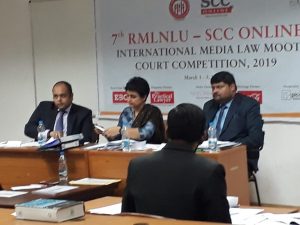
11.57 hours –just to ensure that the speaker is on the same page, judge asked “what is the final relief that the agent seeks as pertaining to this very issue.”
12.05 hours– Judge asked the difference between a declaration and being adjudged to which the speaker fling back in a crisp fashion.
12.07 hours –Symbiosis recited their prayers and took a sigh of relief!
12.10 hours –now was the time for the NUJS to put their A game. Before beginning, he told the time that would be used by both the speakers in addition to the time reserved for sur-rebuttals.
12.12 hours –judge asked the most basic question – which party is the agent representing. To one’s shock the speaker answered incorrectly.
It is clear that the stakes are very high and it is natural to not always stand against the wind in such circumstances.
However, the speaker corrected the mistake and sought apologizes.
12.20 hours –the judge asked the difference between effective and overall control. The speaker while citing different authorities told the distinction between the two.
12.22 hours –the brother judge created an assumption as the facts were silent on that very point and wanted to know how the agent would be dealing with the same.
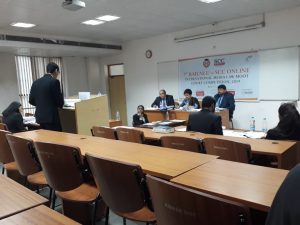
12.24 hours –judges inquired about the actions that were taken after the cyber-attack. They were precisely emphasizing on the remedial measures.
12.35 hours –the continuous shoot of questions made the speaker 1 a bit on the low-side. But however, this would be too soon to reach a decision as speaker 2 was still to make an entry!
After 2 hours of non-stop discourse, the teams took a sigh of relief! But for how long as the results for the finalists were to be announced soon. With fingers crossed and heart skipping beats, the results were announced and the finals were set to be held between –
NLUJ v. NUJS
A heartily congratulations to both the teams. Do it well. Break the leg! This event turned more interesting with each passing round and the finals are expected to set a higher mark.
Finals
Both the teams are in a fit position, the judges have arrived and the grand moot court hall of RML is set up which carries an artistic vibe and is an vital structure in which RML students take pride in.
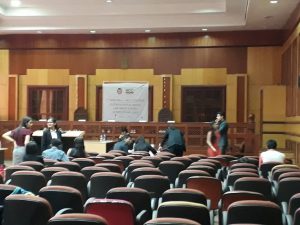
The finals will be presided by the following personalities – Hon’ble Mr. Justice Moin, Addn. Judge Allahabad High Court (Lucknow Bench), Hon’ble Mr Justice Lavania, Addn. Judge Allahabad High Court (Lucknow Bench), Mr. Vikramjit Bannerjee, Additional Solicitor General of India, Mr. Murali Neelkanthan, Principle Amicus and Mr. Abhishek Dwivedi, Associate Cyril Amarchand Mangaldas, the problem drafter of this edition’s moot proposition.
Moot Court Hall, NUJS (appellants) v. NLUJ (Respondents)
15.26 hours – speaker 1 began the proceedings and structured the issues that will be dealt by each of the speakers along with the time that would be taken by each of the speakers and time for rebuttal as well. Speaker 1 would be dealing with issue 2 and 3.
15.30 hours –taking facts into consonance, the speaker was about to state an argument when one of the judges stopped the speaker and asked an authority in order to substantiate the argument that was advanced by him.
15.33 hours –even after countless attempts to carry on with the argument the judge made it crystal clear that in order to pursue the same argument an authority would be needed and in the dearth of which he should better proceed to the next argument.
15.38 hours –the speaker nevertheless continued with the next argument in line.
15.39 hours –the speaker while advancing arguments pertaining to cyber wars or threats cited several authors who had expertise in that particular domain.
15.44 hours –irrespective of numerous arguments, the judge asked the need of a judicial interpretation.
15.47 hours –after the 1stspeaker left the podium, it was quite evident that the judges were not so persuaded.
15.51 hours –speaker 2 would be dealing with issue 1 and 4.
15.52 hours –the google spain case held that “right to be forgotten is a subset of right to privacy.” But the judge pointed out the anomaly in the case.
15.57 hours –the same argument is being clinched for a while and with each passing moment the hassle on the speaker is being built.
16.01 hours –judges were taking a close grip of the situation and were pushing the speaker close to the cliff!
16.03 hours –the judge made a jest which lightened the tension that was boiling in the courtroom!! Aah. Quick relief!
16.10 hours –speaker 2 proceeded with his next and last argument before reciting the prayers.
16.20 hours –before NLUJ was about to proceed, the judge made it clear to address the questions that were being raised by the appellants.
16.24 hours –the lack of authority while making some loaded assertions has been a constant part of this round.
16.27 hours –speaker while moving to the next issue, cited an instance of Netflix while pertaining to the privacy issue.
16.45 hours –speaker 2 entry was marked with the some heavy shooting of questions by the constitutional bench.
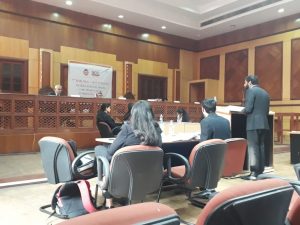
16.49 hours –in order to help the speaker to smoothly dodge the impediments in form of quick questions by the judges, chits were being passed on by the co-speaker and the researcher.
16.51 hours –“what is the test of attributability?” the judge asked. To this, the speaker came up with a satisfying answer bolstering the confidence which was so direly required at the moment.
17.02 hours –due to paucity of time the judges asked the speaker to brief in bullet points before she concluded with her prayer.
17.04 hours –the following few minutes were marked by rebuttals and sur-rebuttals.
So this marks the end of the Finals! What a scintillating round it turned out to be with some quick repartees. The hard work is done but in whose favour this hard work will pay off was still to be unveiled. The finals were followed by the Valedictory Ceremony which was chaired by Prof Subir K Bhatnagar, Vice Chancellor Dr. RMLNLU, Dr. Atul Kumar Tiwari, Chairman Moot Court Committee, Hon’ble Mr. Justice Moin, Addn. Judge Allahabad High Court, Hon’ble Mr. Justice Lavania Addn. Judge Allahabad High Court, Mr. Vikramjit Bannerjee and Mr. Murali Neelkanthan and Mr Sumeet Malik, Director EBC.
And finally the results were announced as everyone was on the edge of their seats. Following are the results –
Winners : NUJS
Runners Up : NLUJ
Best Oralist : Eashwari Nair (SLS, Hyderabad)
Best Memorial : NLUO
With the announcement of the results, the event was concluded! 7thedition of RMLNLU SCC Online International Media Law Moot Court Competition, 2019 turned out to be a successful event. And the Moot Court Committee of the college have set a higher benchmark this time and is no less excited for the next edition! Thank you for being such a patient audience.
Reported by –
Devansh Rathi, RMLNLU (II Year)


